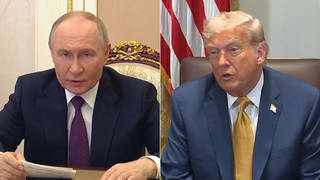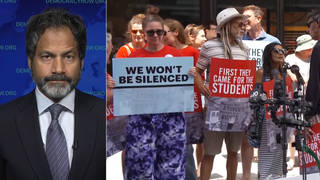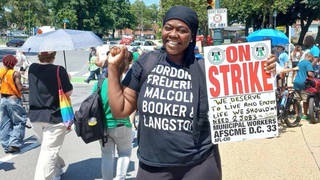
Amnesty International is condemning Iraq for holding an estimated 30,000 prisoners without trial, including 10,000 prisoners who were recently transferred from US custody. In a new report, Amnesty documents that Iraqi prisoners are being arbitrarily detained and often beaten to obtain forced confessions. [includes rush transcript]
Transcript
AMY GOODMAN: Amnesty International has released a new report that finds more than 30,000 prisoners are being held in Iraq without charge, including 10,000 prisoners who were recently transferred from US custody. Amnesty’s report is called “New Order, Same Abuses: Unlawful Detentions and Torture in Iraq.”
Malcolm Smart is the director of Amnesty International’s Middle East and North African program. He joins us here in London.
Welcome to Democracy Now!, Malcolm.
MALCOLM SMART: Thank you, Amy.
AMY GOODMAN: Can you summarize for us this case, this extremely painful case of Ramze Ahmed?
MALCOLM SMART: Well, his case, unfortunately, is all too typical of many that we hear about. In this case, his wife is here in the UK and is more able to make public her concerns and express the anguish that she and other members of the family are going through. But his case is all too familiar of situations where people are detained, taken away, sometimes in the dead of night. Nobody knows where they’ve gone. Their families don’t hear about them maybe for several months, in this case for over four months. Then they surface. So they disappear, and then they — if they surface, often —-
AMY GOODMAN: She described, in the case of not hearing from him, he goes to find his son Omar, who’s also in custody -—
MALCOLM SMART: Yes.
AMY GOODMAN: — doesn’t hear for four months, then gets a call on her cell phone. And she said she didn’t know who was calling her.
MALCOLM SMART: Yeah.
AMY GOODMAN: She didn’t recognize the voice, and then she realized it was Ramze, her husband. He was so weak, it had so changed.
MALCOLM SMART: Yes, yes. Well, in this case, you know, somehow he was able to get hold of a mobile phone and call her. That’s a fairly rare occurrence, I think. And I believe that call was cut quite quickly. But at least she found out where he was, and she was able to alert the authorities. He was being held at a secret prison, one of — well, we don’t know how many, but a number of secret prisons in Iraq, where, typically, again, detainees have been held without anybody knowing why they’re there for long periods of time, during which they’ve been tortured and ill-treated, and, in many cases, forced to sign statements that they think were confessions, often without being able to see them themselves, and confessions which may lead to them being charged — not in this case, at least yet, but in some cases — to being charged with capital offenses and sentenced to death and even executed.
AMY GOODMAN: She showed us videotape, actually, from her cell phone. She had filmed Iraqi TV —-
MALCOLM SMART: Right.
AMY GOODMAN: —- which showed Omar, her stepson, Ramze’s son, with a hole or a mark on his head. And she said his voice wasn’t his own, and he was speaking very quickly, some kind of confession that she couldn’t believe, and that she had been told by her husband that they were threatened that he would be forced to rape his father. They would even pick up the grandson, and he would be forced to rape the grandfather. How typical is this? And what can be done?
MALCOLM SMART: Well, I think part of the problem is really a problem of impunity. This has been going on for all too long, and there’s a culture of abuse that has taken root. It was certainly there during the days of Saddam Hussein, but what we wanted to see from 2003 was a turning of the page, and that hasn’t happened. So we see secret prisons, people being tortured and ill-treated, being forced to make confessions. And the courts, although routinely detainees claim that they were made to sign false confessions, the courts are really not investigating those and coming to grips with them. And the perpetrators are not being held to account. They’re not being identified. On a number of occasions, the government has reacted by saying it will appoint inquiries after secret prisons have been disclosed and their locations have been found and prisoners in them have been found to be in a very severely ill-treated position. But the outcomes of those investigations have not been made known.
AMY GOODMAN: Deaths in custody?
MALCOLM SMART: Likewise with deaths in custody. We have in our report details of several cases where deaths are alleged to have occurred as a result of torture or ill treatment. Now, the standard practice of any authority in that situation, required by national law and required by international law, is to carry out an independent investigation. What were the causes, what was the circumstances, of the death? Now, this hasn’t happened. And again, we’re calling attention to the need for the government to show the political will to take measures against the torturers.
AMY GOODMAN: Malcolm, there were 10,000 prisoners, in your Amnesty report, transferred from US custody in Iraq to Iraqi custody — US basically transferring prisoners to a system that tortures them, unclear what happened to them in US custody.
MALCOLM SMART: Well, part of the problem with the situation has been that the US forces have been detaining people. And, of course, we know from the days of Abu Ghraib and so on, their record has not been a good one. It’s been improved in recent times, but at least — so there was some control over the prisons exercised by the US.
Since the beginning of 2009, under what’s called the Status of Forces Agreement, the two governments agreed to transfer custody of the prisons and prisoners to the Iraqi forces. Now, many of those detainees held by the US forces had been held without charge or trial for years without any means to challenge their detention. We’ve not made the claim that all those people are innocent of crimes. If they are accused of crimes, they should be held to account in accordance with international fair trial standards. But many detainees say they’ve been arrested for reasons that they don’t know, on the basis of information from secret informants who themselves may have been tortured or brutalized and named names of people. So, there’s not been an independent process. And here, we saw this Status of Forces Agreement at the end of 2008 making the way for the transfer, with no human rights safeguards written into that, although, quite clearly, US forces know that the record of Iraqi forces is a very grim one.
AMY GOODMAN: And the US is pouring millions, if not billions, into Iraq. The US forces are still there. They could do something.
MALCOLM SMART: Well, you know, I’m being told that the US forces now see it as an Iraqi issue, and the last of the prisoners, except for 200 who remain in US custody, have been handed over. In some cases, as we describe in our report, actually, the US recommended some of the people they had detained be released. But, in fact, the Iraqi authorities have continued to detain them.
AMY GOODMAN: We don’t have much time, but I want to get to this report that you did on “Yemen: Crackdown on Opponents Leading to Mass Human Rights Violations.” Could you briefly describe this simmering situation?
MALCOLM SMART: Well, in Yemen, the situation is also acute. And what we’ve seen — you remember the alleged bomb attempt over Detroit, I think it was, on Christmas Day. That threw attention on Yemen and the role of al-Qaeda in Yemen, and clearly there’s a problem in that regard. But there are other severe problems in Yemen and in the northern Sadr area where there’s been an intermittent civil war, a war going on for the last six years, and where, at the end of last year, the government announced they launched a new military policy. Saudi Arabia became involved. And what we saw was aerial bombardments of this area closed off to outside observers.
AMY GOODMAN: With US involvement in that bombardment?
MALCOLM SMART: With Saudi involvement in that particular issue, not US involvement, as far as we’re aware, but certainly bombing raids by Saudi forces, as well as Yemeni planes. Yemen also has a major secession movement that has developed in the south. The former South Yemen — Yemen is a unity of two countries, which are now — where people in the south are alleging they’ve been discriminated against, and protests by southerners receive such a heavy crackdown by the government that that has fueled the cause for secession, to be honest. And then we have the issue of al-Qaeda and a rather gung-ho policy that’s been going on of suspected al-Qaeda members — “Let’s carry out an aerial attack.” And there’s been a couple of occasions now where aerial attacks have been carried out, one particular one at a place called Abyan, where something like forty civilians were killed, and it’s not clear at all that there were al-Qaeda people there. But certainly, even if there were, the kind of force used was such to be disproportionate.
AMY GOODMAN: And who attacked?
MALCOLM SMART: Well, the remnants of the munitions used, as far as we’ve seen, appear to have been a Tomahawk missile, which would suggest the attack was carried out possibly from a US ship.
AMY GOODMAN: We’re going to have to leave it there, Malcolm Smart, director of Amnesty International’s Middle East and North African program. We will link to both reports — your report on Yemen, as well as your report on the 30,000 detentions of the Iraqi prisoners in Iraq who are being held without charge.













Media Options